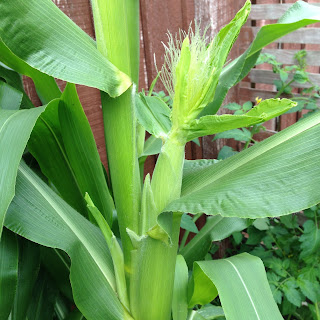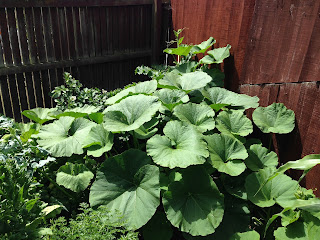A year later, it is probably time for an
update on the garden experiment in New Zealand. It was a big learning experience, especially
for someone who was largely ignorant about food cultivation. Admittedly, it was enjoyable taking care of the plants and harvesting the fruits and vegetables. I never thought I would like this activity, but I am looking forward to doing it all over again in the upcoming season!
 |
| garden all planted with the raspberry seedling and existing rhubarb in the corner |
 |
| the garden earlier in the season |
 |
| the garden near the end of the season |
We discovered that there is a large sink at one
end of the garden bed, so what happened was some of the carefully placed seeds migrated from
their neat rectangular patches and grew in what was supposed to be the walking
path. And the weeds loved the fresh soil and fertilizer; it was a constant
battle most weekends to keep them under control. I kept it organic so no weed killer.
The rhubarb that had been left by the
previous occupants grew fast with mega leaves that had to be cut back often so
as not to literally overshadow that whole corner. I couldn’t see much use for
it in cooking besides making something sugary, so I left it alone. Plus, I am always worried about this plant because of its poisonous nature.
The silverbeet that must have been grown by
previous occupants grew up all over the patch and did very well, although
again, I didn’t want it and gave it away. It is a kind of bitter green leafy
plant and why people pay for it in the stores, I’m not sure! Lettuce is much
pleasanter.
The strawberry plants along the fence that I found from the previous occupants did pretty well for such little things, probably each giving out 5-10 berries. When berries are so expensive, it was great to have some free fruit!
Seeds We Planted:
Peas, corn, lettuce, cauliflower, zucchini, broccoli, tomatoes, watermelon, pumpkin, spinach, carrots, cucumber, and chili peppers.
The butter lettuce grew fast and I enjoyed
being able to pick leaves for fresh salads on the spot.
The spinach also grew fast and tall and we
had to put up spikes to hold it. At first there were large leaves, but then
they became small and harder to use.
The zucchini was probably the best producer
of all, with dozens of zucchini (some really large) over the season. Too much
zucchini!
The potatoes had huge growth above ground
(probably because they were in the sink and receiving lots of washed-down
nutrients and water). We got several small potatoes out of the ground.
The corn grew several tall stalks, taller
than me, and produced a few yummy yellow corn cobs. Other cobs were only
partially developed.
The tomato plants were late starters but
produced dozens of little tomatoes that fell off the vine at a touch when they
turned red. These plants had to be staked and attached to the trellis as well,
they got so big.
The chili pepper plant chugged out a few
slim green peppers that we used in salsas. It faced constant pressure from the
sprawling tomato plants.
Not-so-successes:
The raspberry seedling stayed alive but
never produced any fruit. Hopefully it will this next season.
The cucumber area was overrun by weeds, but
since I didn’t know that they were weeds and not the cucumber plants, I let
them grow huge before asking a neighbor if they were weeds. Only one cucumber
managed to grow afterwards, and it was a sad, small, spiky one.
There was a plentiful number of carrots and
the green tops were quite cute. However, the orange parts were so small with so
many ridges where dirt clumped that it was difficult to clean them, cut them,
and have any edible area left.
The peas took off but the pods were very
small and suddenly the plants all started dying so I only had a chance to eat a
couple. They later came back with tons of pods but they stayed small and never
finished ripening.
The broccoli never produced so I don’t know
what happened there. The other plants might have crowded it out too much.
The pumpkin plant grew rapidly and tried to
take over the garden; it had to be cut back frequently. There were several
pumpkins but they froze before we could figure out what to do with them.
The watermelon didn’t make much
progress above ground before the pumpkin quickly took over its area.
The cauliflower only started growing at the
end of the season and produced a couple small heads, but they got really dirty
and didn’t have much edible portion once I cut away the brown parts.
Outside
the Garden:
The parsley, basil, and mint made more than
we could possibly use. The jalapeño pepper plants produced a couple dozen small
and medium peppers, which made for tasty Mexican dishes and super-spicy hot
sauce. We are planning on growing a much larger batch this season because they
are expensive to buy and usually only available canned at the grocery store.
Overall, gardening was a success as a learning experience and for giving us something to do outside away from the computers. I would listen to TV shows or TedTalks or music, and it gave me a reason to spend time in the sunshine. The best part is seeing the transformation of little sprouts into full plants with food to eat! The miracle of nature...







































